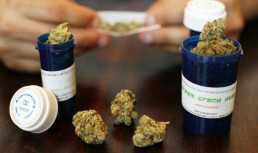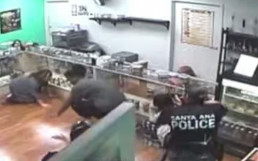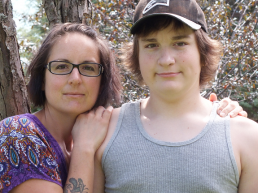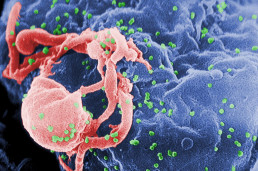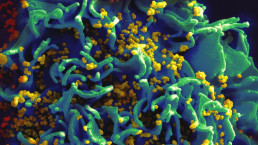Teen "Breathes on his Own" after using CBD Oil
Teen “Breathes on his Own” after using CBD Oil
After 20 medications failed to treat a dying New Zealand teenager, cannabis oil may have saved his life.
TVNZ reported that Alex Renton was taken off life support due to improvement following emergency medical marijuana treatment. Alex Renton’s story has sparked a national debate about the morality of medical marijuana in New Zealand.
Alex’s mother Rose says “He breathes all by himself now with no help…His heart is strong and his lungs are strong.”
Alex had been taking Elixinol™, a cannabis oil treatment, for nine days. The Elixinol™ was imported from the United States pending a special government approval. Elixinol™ is made from extracting CBD from raw hemp product. A 10 ml tube of the product has 1800mg of CBD. Drops are administered twice a day underneath the tongue.
Alex suffered from status epilepticus, a sort of prolonged seizure. Medical cannabis has been garnering attention for its effectiveness against epilepsy in its many forms. The only alternative would be heavy sedation on benzodiazepines. 10-30% of those suffering from status epilepticus are dead within 30 days. The Associate Health Minister Peter Dunne approved a one-time course of treatment for the teen. The CBD-rich hemp oil came from a company the United States.
Rose Renton explains “Alex could be woken very slowly if the seizures stop… His sedation level is still high.”
During the first treatment a few weeks ago, reporters were skeptical of his recovery. However, the cannabis oil appears to be working. The 19-year-old has been bedridden in a Wellington hospital since April. After Alex’s family urged the doctors to increase his dosage, Alex will begin taking cannabis oil four times a day. Alex’s other six siblings are now able to visit him. Amazingly, the New Zealand media questioned the morality of using cannabis oil in this scenario.
Alex is now able to open his eyes but it will take longer until he is able to communicate. Rose says “Today he is stronger, as the room is quiet. There is no monitoring and beeping, less medication and more rest.”
An electroencephalogram(EEG) will measure the actual success of the cannabis oil. Alex’s brain scan indicated that there while were still seizures lingering, they were able to reduce sedatives enough for him to finally open his eyes. Alex’s condition is not a simple case nor will it be a simple cure.
Rose says “The hospital are working with us. Without hospital sedation, Alex wouldn’t be here. People want a [cannabis oil] miracle, and so do I. But we are realists too.”
In some cases there is no alternative to cannabis oil. Alex Renton’s case is a perfect example. It’s time for the world’s greatest nations to make it available everywhere that it’s needed.
"Uneducated Doctors" Harming Connecticut Medical Marijuana Program
“Uneducated Doctors” Harming Connecticut Medical Marijuana Program
Connecticut medical marijuana patients will have to wait in line because due to a shortage of licensed physicians and marijuana producers willing to participate. The lack of education about state laws and general ignorance are to blame. Connecticut’s Medical Marijuana Program is looking for additional doctors willing to prescribe medical marijuana.
In June 2015, FoxCT reported that there are 4,097 patients registered for medical marijuana in Connecticut and 222 doctors prescribing it. The state government is reaching out to 7,000 more doctors in the Connecticut State Marijuana Society in an effort to erase the stigma that limits the availability needed in Connecticut.
Angela D’Amico is fighting for medical marijuana in Connecticut. D’Amico has ten years’ experience running medical marijuana dispensaries in the past in California. Her enterprise, D&B Wellness Center rose from the ashes after she failed in Stratford and Bridgeport, Connecticut. Finally she was able to secure zoning approval in Bethel, Connecticut.
D’Amico explains “I felt like it was divine intervention. I really felt my knees go weak… [D&B Wellness Center founders] were working on four days of no sleep. We did a month’s worth of work in days.”
Securing various approvals is just one of the pitfalls aspiring dispensary owners can face. The inaction of doctors is hurting patients that have to travel to find access. D’Amico believes doctors are timid and unaware of safe approaches like CBD oil. She told News Times “Since we’ve gotten in the concentrated cannabis oil, with one-to-one ratios between THC and CBD, the oils have come to the top of our largest use… People are getting away from smoking loose flowers. They’re using oils for e-cigarettes and concentrated cannabis oil delivered in syringes sublingually.”
On April 22, 2015, a panel of doctors voted to approve two more conditions that qualify for medical marijuana. Also in March, the zoning board reviewed regulations for marijuana dispensaries. Patients that are genuinely sick cannot reasonably travel to the small amount of dispensaries sprinkled sparsely throughout the state. Zoning board member David Stein says “The problem is you have people who need it for medical reasons and yet have to travel quite a distance to Bethel in order to get the help they need.”
Jonathan Harris, Commissioner to the Department of Consumer Protection(which licenses dispensaries) said “It’s a private-sector model and it should be driven by the businesses, patients and doctors on the ground. It’s a unique position as a regulator to clear up the misinformation, tear down some of the barriers and give people some comfort that they’re not going to get into any kind of trouble if they participate.” The deadline to apply for a dispensary license is September 18 at 3pm.
Medical marijuana laws are here to stay. States that have recently adopted medical marijuana like Connecticut should look towards veteran cannabis states like California, which has maintained legal medical marijuana for nearly 20 years. The attitude about cannabis in Connecticut will surely follow as well.
Police Raid California Medical Marijuana Dispensaries
Police Raid California Medical Marijuana Dispensaries
On May 26th, Police in Santa Ana, California raided the Sky High Holistic dispensary.
They destroyed all but one hidden camera. Footage from the surveillance video illustrates the excessive force and dodgy tactics that were used.
As the story unfolds, both the Santa Ana Police department and the mayor of Santa Ana allegedly accepted bribes from other dispensaries that competed with Sky High Holistics. Attorney Matthew Pappas filed a lawsuit against the Santa Ana Police force and Mayor Pulido on behalf of Sky High Holistic.
Among those interrogated was Marla James, a disabled volunteer. One of the officers mocked one of her customers, an amputee. After seeing the footage , James told ABC7 news “How can I respect someone like that? It just makes your stomach turn — maybe she doesn’t know what it’s like to have an amputation. I don’t know what was going through her head, but man that was so disrespectful.” Also in the footage you can see another officer eating a medical marijuana brownie. Clearly, it appears that particular officer didn’t object morally to marijuana.
Many cities in Southern California have incorporated lottery-type ordinances to reduce the number of dispensaries. There are only 20 dispensaries that are permitted to operate in Santa Ana. Sky High Holistic was not one of the lucky ones. Matthew Pappas’ lawsuit alleges that Santa Ana mayor Miguel Pulido was paid by at least one dispensary that was issued a permit, giving it immunity from the Santa Ana Police. Also the lawsuit outlines how other city officials abused their power to shut off power and water services to dispensaries that couldn’t afford to bribe them.
The total damage is well over $100,000.
HIV Researcher Receives $1 Million Donation from Marijuana Producer
HIV Researcher Receives $1 Million Donation from Marijuana Producer
On June 8th an HIV researcher at the University of British Columbia received a $1 million donation from National Green Biomed, a major Canadian medical marijuana producer.
National Green Biomed is attempting to obtain a license from Health Canada to produce and sell medical marijuana legally. The size of the donation is a reminder how urgent this kind of research is needed.
National Green Biomed hopes to become the next licensed marijuana producer in Canada. Currently there are 19 federally-funded producers licensed by the Health Canada.
The company has donated $200,000 to UBC so far, and they say they plan on donating more.
The money will fund research spearheaded by assistant professor of medicine M-J Milloy. Kelly Sinoski of the Vancouver Sun said “Milloy, an infectious disease epidemiologist with the UBC Division of AIDS and the British Columbia Centre for Excellence in HIV/AIDS, conducted a study that found HIV positive people who used marijuana at least daily had less than half the concentration of the HIV virus in their blood compared to people who rarely or never consumed cannabis.”
The study was published in the March edition of the Drug and Alcohol Review. The research will help identify exactly how cannabis slows the replication and infection of HIV- not just the symptoms.
Dr. Julio Montaner is the head of the UBC Division of AIDS and director of the BC Centre for Excellence in HIV/AIDS.
“We have long heard from our patients that they perceive that they obtain health benefits from cannabis use,” said Dr. Julio Montaner. “This contribution will allow us to begin to rigorously assess whether these benefits are truly real.” UBC’s president Arvind Gupta is in favor of the university’s research and a quest for answers in “unconventional places.”
Claudette Cardinal is one of the HIV+ Canadians that will be directly affected . Cardinal’s thoughts were included in the June 8th announcement.
“I have faith in the therapeutic properties of cannabis, to keep me on a healthy path- But I know one person’s faith alone isn’t enough when it comes to new medical treatments. We need scientific research to find out more about the effects of cannabis – both its benefits and its risks – as we do with other drugs. That knowledge would help doctors like Dr. Montaner and patients like me make more informed decisions, instead of relying on rumours and impressions… …This gift, and the knowledge we will gain from it, has the potential to improve so many lives, by possibly helping people like me tolerate life-saving medication, and by possibly revealing other benefits for our health. Who knows what we might find? But if we don’t try, we will never know.”
I am one of the millions of HIV+ patients that rely on medical marijuana. I’ve consistently stayed undetectable and I believe medical marijuana has helped. However, the donation from National Green Biomed is a reminder that our work is nowhere near complete.
Minnesota Patients Still Being Denied Medical Marijuana
Minnesota Patients Still Being Denied Medical Marijuana
Angela Brown is a hero. A responsible mother of three in Minnesota, she endured a year of court fees and prosecution for giving her sick 15-year-old son cannabis oil. Her home was raided and she was forced to drop the cannabis oil even though it would have become legal on July 1st, 2015. Brown faced two years imprisonment until recently accepting a plea deal. Minnesota’s fear of cannabis is still preventing patients from access to medical marijuana.
A mother will go to any length to protect the well being of her child. Brown travelled all the way to Colorado to legally purchase the cannabis oil, just before it was legalized in Minnesota. Trey Brown suffers seizures and chronic pain after a baseball accident caused traumatic brain injury. Brown says the cost of medical bills to replace the cannabis oil has already cost $8,000. She was defended free of charge by Atty. Michael Hughes. Brown eventually accepted a plea agreement in order to prevent her son Trey from being forced to testify against her.
“I was kind of looking forward to the trial,” said Hughes, whose client has become a celebrity in medical marijuana circles, most recently appearing in the documentary Pot (The Movie), which debuted at the Minneapolis-St. Paul International Film Festival last weekend. “But it’s a good resolution … [The prosecution was] going to subpoena the child.”
On July 1st, 2015, Minnesota will allow patients to register under the new medical marijuana law passed last year. Unfortunately, doctors in Minnesota are reluctant to embrace the new law, leaving dying patients waiting. As of June 7, 2015, only five patients in the entire state have been able to sign up for the patient registry.
Minnesota is still miles away from the progress observed in states such as California or Colorado. For instance, a doctor’s cerification cost $200 in Minnesota as compared to about $40 for a doctor’s recommendation in California. The conditions for eligibility in Minnesota are extremely narrow compared to the conditions in California. The process for acquiring medical marijuana is much more difficult. 68% of physicians in Minnesota say they will not participate in the program. Only nine percent say they definitely plan on participating in the program.
“The concern that they don’t have enough control of the medication and the amount and dosage is frankly a curve ball to us. It came as a surprise to us that some physician groups are citing that as a reason for no participation,” Minnesota Health Department assistant commissioner Manny Munson-Regala said.
Minnesota restricts medical marijuana to only pills, tinctures, oils and vapors. Only nine illnesses qualify as a legitimate ailment. Trey Brown is one of the thousands of patients stuck in limbo until the process becomes easier.
Angela Brown says “No parent can understand it until they have to sit in their child’s bed and hold them down so they don’t hurt themselves or they have to sit beside them because they hurt so much that they can’t handle your touch.”
Quite simply, the time line for sick patients in need of medical marijuana does not align with the time line for these laws in Minnesota to be set in motion.
How Cannabis Prevents Insulin Resistance in Patients Co-infected With HIV and Hepatitis C
How Cannabis Prevents Insulin Resistance in Patients Co-infected With HIV and Hepatitis C
Drug resistance is a real threat for HIV+ patients. A nagging worry that doesn’t go away. Patients frequently develop resistance to medications because of the high mutation rate of HIV.
HIV adapts to nearly any situation in the body. Patients are not advised to skip even one day of medication. Once resistant, the drug is rendered useless. It nearly happened to myself last year when I lost funding for medication for several months.
Those co-infected with both HIV and Hepatitis C face a different kind of drug resistance- insulin resistance or IR. IR leads to Type 2 Diabetes giving them a trifecta of illnesses- HIV, HCV, and Diabetes.
Fear not, because cannabis can help.
Patients co-infected with HIV and Hepatitis C are referred to as HCV/HIV. Type 2 Diabetes is common among HCV/HIV patients as a result of insulin resistance. Doctors in Marseilles, France found that cannabis helps prevent IR or insulin resistance in HCV/HIV patients.
HEPAVIH is a French community of HCV/HIV patients. 703 members of HEPAVIH were analyzed over 60 days by scientists in Marseilles, France. A lowered risk of IR was noted among the participants. Based on this evidence, daily cannabis use, or any use of cannabis at all significantly reduced the risk of IR in HCV/HIV patients. The research by a team of French scientists concluded,
“Cannabis use is associated with a lower IR risk in HIV-HCV-coinfected patients.”
Preventing IR with cannabis is not exclusive to those co-infected with HCV/HIV.
The correlation between cannabis use and decreased diabetes was published by the British Medical Journal three years earlier in 2012. The previously known effects of cannabinoids prompted the research by several doctors at The University of California, Los Angeles. Dr Magda Shaheen’s team concluded,
“We hypothesized that the prevalence of diabetes mellitus(DM) would be reduced in marijuana users due to the presence of one or more cannabinoids because of their immunomodulatory and anti-inflammatory properties… …Marijuana use was independently associated with a lower prevalence of DM.”
A common misconception was that marijuana use accelerated liver failure in HCV/HIV patients. This claim was refuted in the June 28, 2013, advance edition of Clinical Infectious Diseases. No evidence was found supporting cannabis and the acceleration of fibrosis or cirrhosis. The benefits of cannabis on HCV/HIV patients outweigh the risks.
It’s hard to visualize a scenario worse than an HIV diagnosis but keep in mind those suffering from HIV super-infection(multiple strains) and those co-infected with other STD’s such as Hepatitis C. It’s relatively common.
And Cannabis can certainly help if you’re co-infected with HCV/HIV.
How Cannabis helped this HIV Patient
How Cannabis helped this HIV Patient
I was infected with HIV in 2011. I take antiretrovirals, steroids, and medical marijuana. Medical marijuana enables me to go jogging, it increases my appetite, and it is the only treatment that hasn’t had severe lasting side effects on my body. I’m in a serodiscordant couple- my husband is HIV-negative. In addition to the growing list of ways marijuana helps people with HIV, marijuana can also decrease the risk of seroconversion.
My blood labs are analyzed monthly for viral load(the number of HIV copies) and my CD4 count (the number of T-cells.) I smoke marijuana everyday. I’ve been consistently undetectable and my last T-cell count was 1280. Undetectable means less than 20 HIV copies per cubic millimeter. An average healthy person has anywhere from 500-1500 T-cells in a cubic millimeter of blood. Without treatment, HIV decreases 50-100 cells per year. A person with an undetectable viral load is extremely unlikely to pass it on to another person.
Dr. Patricia Molina’s research team at Louisiana State University was initially formed to analyze the negative consequences of drug abuse upon HIV-infected patients. In 2011 Molina studied infected monkeys on THC. They expected to find an increase in the progression of AIDS. Ironicly, their data suggests marijuana use blocks the spread of HIV, specifically in the intestinal tract. The gastrointestinal system is attacked almost immediately after after infection. HIV destroys cells lining the digestive tract, creating “highways” for the HIV to enter the blood stream. This intestinal damage is one of the leading factors HIV accelerates to domination so quickly.
Rhesus monkeys infected with SIV(monkey HIV) were studied over 17 months. “When we started the study, we thought [THC] was going to increase viral load [the amount of the HIV virus that is present in the gut.]” THC activates CB1 and CB2 receptors in our brain. Once activated, the CB2 receptors manifest themselves all throughout the body including the gastrointestinal tract. The CB2 receptors in turn build healthy cells lining the digestive system. In other words, THC prompts our bodies to rebuild damaged areas in our bodies caused by HIV. Molina’s work in 2011 was virtually ignored because medical marijuana is widely known for treating late-stage AIDS patients with depressed appetites.
HIV has jumped from chimpanzees to the human race at least three times. We know this based on phylogenetics. It only makes sense to test infected monkeys rather than risk testing humans with the absence of life-saving antiretrovirals. We still know very little about HIV, since it the virus was barely indentified in 1983.
Others have stepped in to discredit Molina’s findings, such as ProjectSAM. Organizations such as ProjectSAM contend that we need more time to evaluate the evidence. People like me just don’t have time to wait. It’s essential that these organizations should look at the hard data instead of clinging to the idea that marijuana is an illicit substance.
I plan on continuing using medical marijuana along with antiretrovirals. Antiretrovirals have caused me to experience pronounced hallucinations and abnormal dreams- far more psychoactive disturbances than from marijuana. After deep research and my own experiences in my drug treatment, I’ve come to the conclusion that medical marijuana is absolutely necessary.


